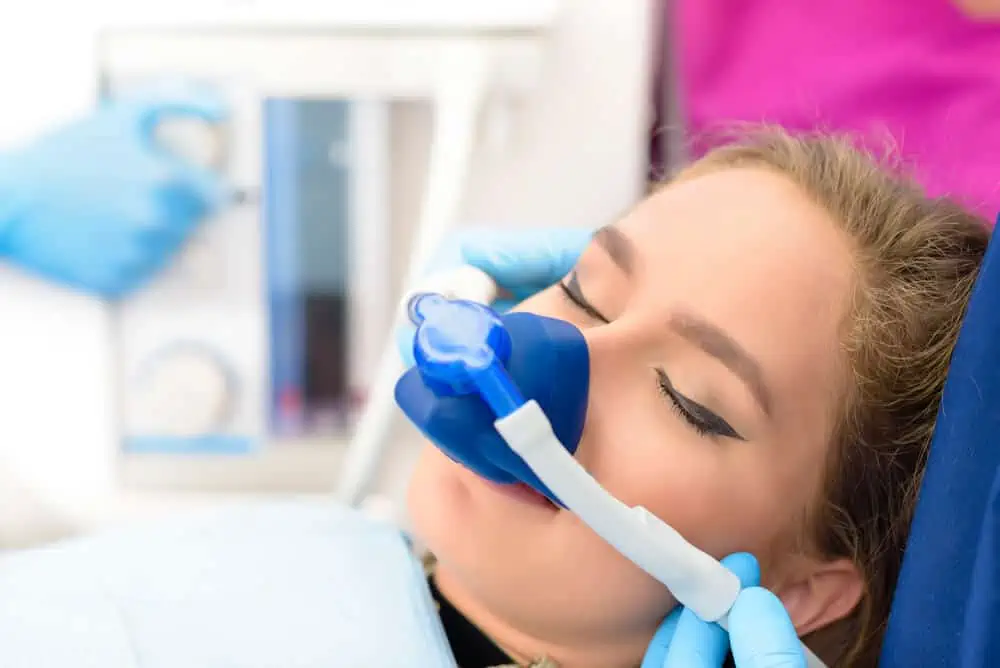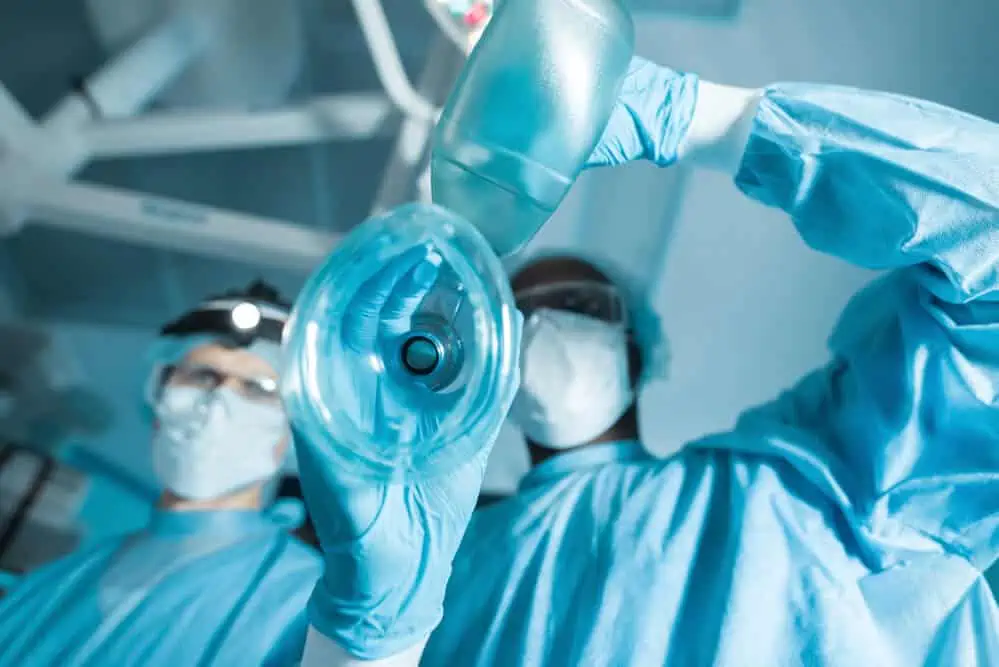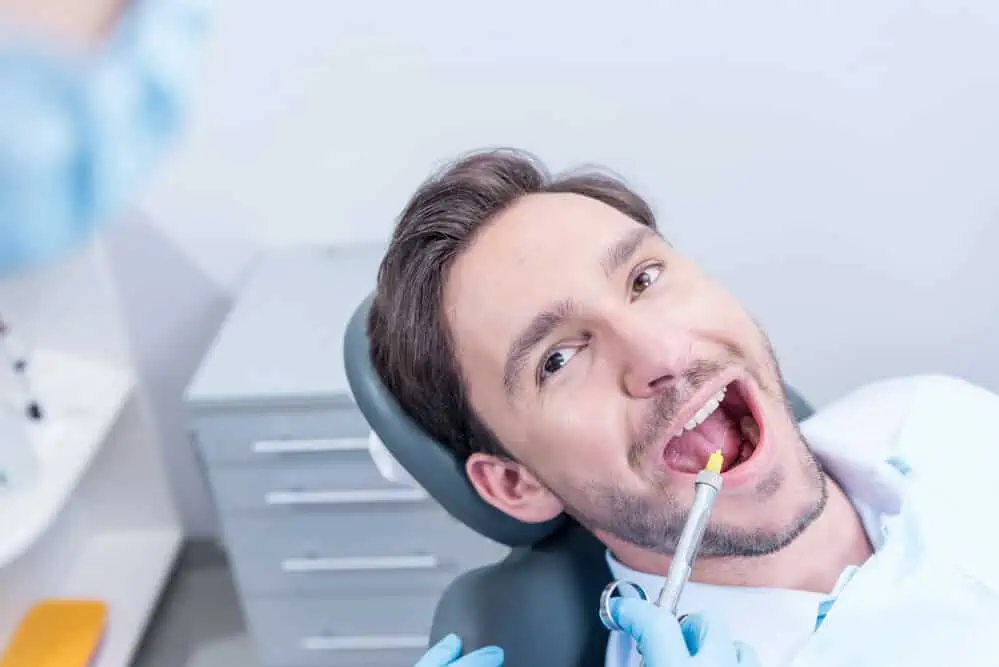Many people feel anxious about visiting the dentist – or avoid it completely – because they worry about experiencing pain and discomfort. Fortunately, dental sedation services can make it a less daunting experience. Sedation dentistry has become quite common over the past few years, and the various styles of dental sedation available today have made it easier for people to overcome their dental anxiety and get their dental problems fixed.
But what exactly is dental sedation? How does a dentist administer it? And what are the associated costs? Keep reading to find out
In This Article
- 1 What is sedation dentistry?
- 2 How does sedation dentistry work?
- 3 Drugs used for dental sedation
- 4 How long does dental sedation last?
- 5 Sedation dentistry safety
- 6 Am I a good candidate for sedation dentistry?
- 7 Is sedation dentistry covered by dental insurance?
- 8 Sedation dentistry cost
- 9 Conscious sedation side effects
- 10 Conclusion
- 11 FAQs
What is sedation dentistry?
Dental sedation (aka sleep dentistry) is an important component of general anesthesia. It includes a range of different techniques that are used by dentists to calm patients or make them more comfortable.
One example that you've probably heard of is laughing gas (nitrous oxide), which dentists use on their patients for dental procedures such as root canals and getting new crowns.
However, sedation dentistry includes so much more than laughing gas, with a multitude of options for patients with dental anxiety.
How does sedation dentistry work?
There are different methods used for dental sedation, each with its own purpose and strength. Your dentist will choose the most appropriate of them for your situation, based on certain factors. These include:


- The dental procedure being performed (for example, removal of wisdom teeth)
- The duration of the dental procedure
- Your level of dental anxiety
According to the American Dental Association, a dentist may choose to induce any one of the following forms of sedation:
- Minimal sedation, in which patients are awake but in a relaxed state
- Moderate sedation, in which patients are conscious but may experience slurring of speech and slight memory loss
- Deep sedation, in which patients are at the verge of unconsciousness but can still be awakened
- General anesthesia, in which patients are completely unconscious
Dental sedation is extremely safe but it is not uncommon to experience drowsiness, headaches, nausea, dizziness and/or dry mouth in the aftermath. Your oral health professional will explain the type of anesthetic that will be used before and/or during your procedure and let you know how you can expect to feel.
Your doctor will also ask you about your medical history in advance so your case can be tailored to meet your needs as safely as possible. Most people are unlikely to experience serious problems. Any side effects experienced are more likely to come from the procedure itself rather than the sedation method.
For more complex and time-consuming procedures, oral and maxillofacial surgeons are the most qualified to safely administer anesthesia. They receive advanced and ongoing training in pain control that is unique from any other specialty in medicine.
Dr. Constantine Simos – Oral Surgery Group
Drugs used for dental sedation
Prior to performing a procedure, the sedation dentist has to choose the appropriate type of dental anesthesia to calm the patient. While some of these types can make the patients completely unconscious, others like oral sedation may only relax them without knocking them out completely.
The most common types of sedation used in dental procedures include the following:
Inhalation sedation (gas and air)
Nitrous oxide is an agent that is inhaled by the patients in order to relax. The effects of nitrous oxide wear off quickly, so you may be able to return to your regular schedule after leaving the dentist's office.


Oral sedation
Oral sedation includes the use of medicines that can be taken via the mouth, such as diazepam. Most dentists instruct the patients to swallow the pills approximately 60 minutes before the appointment.
These oral pills will make you less anxious and a bit sleepy but you will still be aware and able to communicate with the dentist throughout, which is why it is known as conscious sedation.
Intravenous sedation
Intravenous or IV sedation is an important component of sedation dentistry and includes drugs that may put the patients into varying stages of consciousness. General anesthesia is also a part of the IV sedation dentistry which may induce a deep sleep until the effects wear off. This is generally only used for extensive dental procedures such as complicated or multiple extractions (especially in young children) and also some kinds of dental surgery.
Some common pharmacological agents used for IV sedation include diazepam, midazolam, and lorazepam.
How long does dental sedation last?
The exact duration for the effects of a dental sedative to wear off depends on the form of sedation used, the dose used, the duration of treatment, and the ability of the body to recover. The clinician carefully plans and administers the right amount of sedative for your situation.
While nitrous oxide wears off minutes after inhalation stops, oral and IV sedation take at least 1-2 hours to wear off and often much longer.
Sedation dentistry safety
Sedation dentistry is an excellent option for patients who suffer from dental anxiety and have to go through long dental procedures that require them to sit in a dental chair for hours. Yet, many patients get concerned about the safety of using a dental sedative and what to expect after taking one.


To eradicate your concerns about the safety of using a dental sedative, it is important to understand what to expect after receiving one. While you must discuss the specifics with a dentist, the following general guidelines should be kept in mind.
Before sedation
Before the beginning of the procedure, it is important to avoid eating or drinking for six hours before a sedative is administered. This will reduce the chances of food regurgitation and obstruction of the airways while you are under the effects of anesthesia.
The dentist will then choose an appropriate form of sedation to begin the process. If you have high anxiety levels, you may be advised to use a calming pill prior to the appointment. The dentist may ask your permission to intubate you and give you monitoring devices to keep a check on your vital signs during sedation.
During sedation
As soon as the dentist administers the sedative, it will enter your bloodstream and make you feel relaxed, calm, and a bit lightheaded. You may feel like your arms and legs have gotten heavier too. Before long, you will be too numb to feel any pain during implant surgery or other procedures, and the dentist can then proceed with the procedure.
Smoking marijuana before getting sedation can cause complications during the procedure due to airway blockage. If you are a regular marijuana user, it's very important that you notify your dentist or oral surgeon before your surgery.
That's because marijuana users may require as much as three times more sedation medication to achieve the same type of anesthesia as non-marijuana users.
Your dentist won't judge you, but they do need to know so they can ensure your safety and comfort during the procedure.
Dr. Eric Scharf – 7×7 Dental Implant & Oral Surgery Specialists
After sedation
You might have to stay at the clinic for some time following the procedure in order for your recovery to be monitored. The effects of anesthesia will usually wear off within half an hour; however, you may still feel lightheaded and drowsy for a few hours. Therefore, you should make sure that you have someone to accompany you home and, if possible, stay with you until you feel back to normal.
It's advisable not to do any of the following until the next day after your dental treatment:
- Drive any vehicle or ride a bicycle
- Exercise
- Return to work
- Drink alcohol
- Smoke or use any kind of nicotine products
- Take sleeping tablets
- Use any machinery, home appliances, or sharp utensils
- Cook or heat anything in the kitchen, including water for a cup of tea or coffee
- Make important decisions, including financial transactions
Let's see the process of IV dental sedation on Deanna; a patient who's going to have a tooth extraction.
Am I a good candidate for sedation dentistry?
Having any of the following fears may make you a good candidate for dental sedation:
- Anxiety of visiting a dentist
- Fear of shots or needles
- History of a traumatic dental experience
- Inability to handle noises or smells in a dentist's office
- Having sensitive teeth
- Need of a complex treatment
Is sedation dentistry covered by dental insurance?
Normally, general anesthesia is covered by your insurance plan as it is often a medical necessity for the patient to be in a state of unconsciousness during the procedure. For more information, you may talk to your insurance plan provider to confirm the coverage and acquire a pre-approval if possible.
Your insurance plan may also cover dental sedation if you have a medical condition or a certain disability that requires proper sedation prior to performing any dental procedure. Some insurance plans cover a patient with a medical diagnosis of extreme dental phobia.
Remember that the majority of dental insurance policies cover treatment costs of $1,000 to $1,500 per year, and the fee for your dental treatment along with the cost of sedation may go over this coverage. Therefore, it is advised to take a look at various dental saving plans beforehand.
Sedation dentistry cost
The costs associated with dental sedation vary according to the chosen method. Some of these have been summarized in the table below.
Types of dental sedation | Estimated cost (per 30-minute session) |
Inhaled nitrous oxide | $50-$60 |
IV sedation | $290-$340 |
Deep sedation | $180 |
Non-intravenous sedation | $175 |
Conscious sedation side effects
After intravenous or oral sedation, it's normal to feel drowsy, possibly for the rest of the day. You should take the precautions described above to stay safe during this time. You may also experience some bruising in your arm or hand from the injection, but this should disappear within a few days.
The risk of other sedation side effects is very low. In some very rare cases, patients experience an allergic reaction or vomiting. Tell your dentist if you have any history of allergies to medicine. Your dentist will explain the risks and answer any questions you have before proceeding with any kind of sedation dentistry.
Conclusion
If you are particularly worried about an upcoming dental procedure, inquire about dental sedation from your dentist. Dental sedation will make you feel calmer before getting in the dentist's chair, and will help you relax during your treatment. You might not remember much of it at all, and the idea of returning to the dentist will feel less daunting. You'll also probably feel a great sense of relief at having finally got the dental treatment you have been putting off!
FAQs
Will I feel anything during my dental treatment after dental sedation?
In most cases, patients do not feel a thing. Some may feel slight discomfort, and at the end of the appointment, most are relaxed with no memory of the procedure.
Is sedation dentistry safe for children?
Yes, pediatric sedation dentistry is just as safe as adult sedation dentistry. It is routinely performed in multiple clinical settings, so there is no need to worry.
Anesthesia progress: Nitrous oxide and the inhalation anesthetics. Consulted 8th February, 2020
American Dental Association: Guidelines for the use of sedation and general anesthesia for dentists. Consulted 8th February, 2020.




